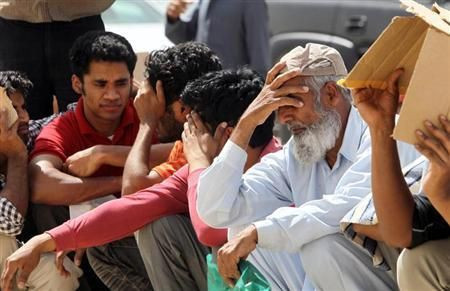Sri Lanka And Saudi Arabia Ink Migrant Labor Rights Deal, More Than One Year After Execution Of Female Domestic Worker

Under pressure to improve the lot of its migrant workers, the Kingdom of Saudi Arabia has entered into a new labor deal with one of its sources of foreign labor, the South Asian island nation of Sri Lanka. Under terms of the agreement, Khabar South Asia reported, the estimated 500,000 Sri Lankan workers – about three-fifths of whom are women -- in the kingdom will gain certain benefits and rights.
Among other items, Sri Lankan workers will receive eight hours off between daily shifts, plus one day off per week. Their Saudi employers will be required to open bank accounts for their laborers and deposit their paychecks there every month. Laborers will also be allowed to hold onto their passports (instead of relinquishing them to employers as in the past) and not pay fees to recruiting agents. Following two years of service, workers will receive a fully paid 30-day holiday in Sri Lanka. Sri Lankans toil in Saudi Arabia as maids, drivers and waiters, among other professions.
The Sri Lankan ambassador to Saudi Arabia, Vadivel Krishnamoorthy, told Arab News that Sri Lankans working in the Middle East send home about $2.5 billion annually in remittances. Sri Lanka has an estimated 1.5 million to 1.7 million people working overseas in total, who sent almost between $6 billion and $7 billion home last year.
In early February, the Sri Lankan Embassy in Riyadh established a 24-hour toll-free phone line for workers to discuss their problems and grievances. Krishnamoorthy told Arab News that his countrymen can see him personally if they wish, without an appointment.
The agreement, already approved by the Sri Lankan Cabinet, is expected to become effective on April 1.
The improved labor agreement is likely to spur more Sri Lankans to seek jobs in Saudi Arabia. Ramani Seneviratne, 42, is a Sri Lankan woman with a husband and two children who worked as a maid in Saudi Arabia for two years to earn enough money to build her a family home in her native land. She needs more money to complete construction and wants to return to Saudi Arabia to work for another two-year term. She says she is pleased by the new labor pact that will upgrade the rights of foreign workers. "We are [currently] living in a mud hut," Seneviratne told Khabar South Asia. "Our dream is to build a permanent house."
Given the extent of abuse meted out to Sri Lankan migrant workers in the past by Saudi bosses, some activists feel the new labor agreement is not far-reaching enough. Prathiba Mahanamahewa, of Sri Lanka's Human Rights Commission, noted that migrant workers still have no legal recourse against employers who physically abuse them. "There are cases like non-payment of salaries in time and physical harassment," Mahanamahewa told Khabar. "An optional protocol should be added to this agreement to monitor its implementation."
Indeed, feelings in Sri Lanka remain raw in the wake of the execution last year of a Sri Lankan woman who was convicted in a Saudi court of murdering a baby under her care. After seven years in prison, Rizana Nafeek, 24, was beheaded with a sword near Riyadh, despite repeated appeals for clemency by the Sri Lankan government and human rights activists worldwide. That incident provoked the Sri Lankan government to recall its ambassador to Riyadh, although it maintained its mission. "In executing Rizana Nafeek, Saudi authorities demonstrated callous disregard for basic humanity as well as Saudi Arabia's international legal obligations," Nisha Varia, senior women's rights researcher of Human Rights Watch, said in a statement.
Among other issues, critics of the execution cited that Nafeek was only 17 (a minor) at the time of the crime; she was reportedly coerced into a confession by Saudi authorities; it was not clear if she even understood the charges filed against her due to language barriers; and she apparently did not receive adequate legal representation. But the Saudi Interior Ministry claimed that Rizana smothered the baby to death after an argument with the parents. Nafeek herself reportedly alleged the baby died from choking on a bottle of milk.
The Asian Human Rights Commission, which had long campaigned for the nanny’s freedom, released a statement that largely blamed her death on the Sri Lankan government of President Mahinda Rajapaksa. “If proper diplomatic effort was made with the required seriousness, the life of this young girl could have been saved,” AHRC stated. “Rizana Nafeek is also a symbol. A symbol of the vast section of the Sri Lankan people who belong to the least advantaged sections of society.”
However, Sri Lanka desperately needs the cash provided by its global diaspora of workers. The Daily News of Sri Lanka reported that the country’s foreign employment promotion and welfare minister, Dilan Perera, predicts that migrant worker remittances will climb to $10 billion by 2020. (Sri Lanka now has a total annual GDP of about $60 billion). Also, more Sri Lankans are opting to work overseas – although fewer females and more males are doing so than in years past, according to the Daily News.
© Copyright IBTimes 2025. All rights reserved.





















